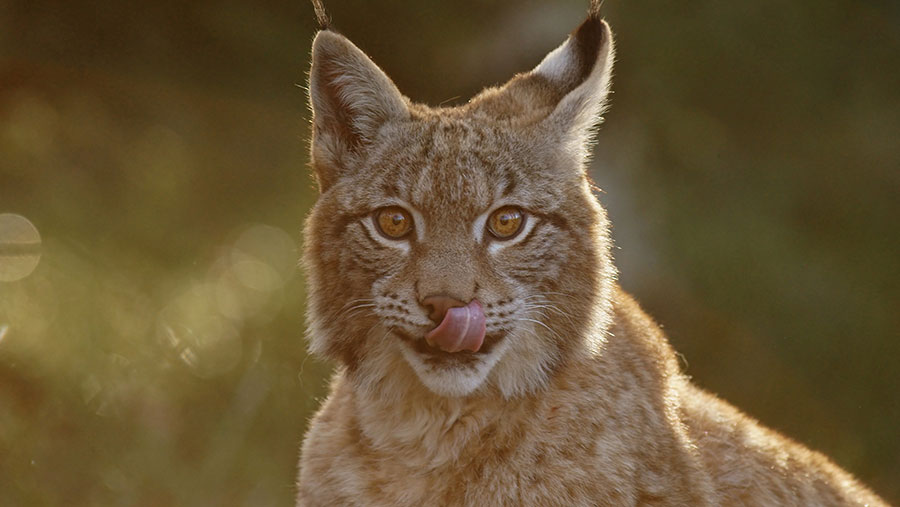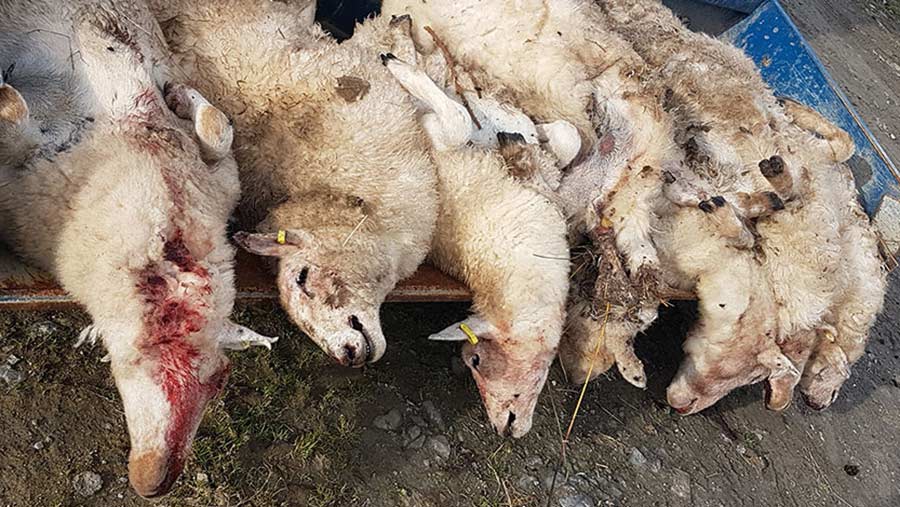Exclusive: Sheep farmer speaks out over ‘lynx attack’
 © imageBROKER/REX/Shutterstock
© imageBROKER/REX/Shutterstock A sheep farmer has told of the heart-stopping moment he came face to face with an escaped lynx which is suspected of killing eight of his flock.
Owen Jenkins said he found the lynx stalking about 10m behind him after he and a zoo worker had gone to check on his sheep last Tuesday (31 October).
“A zoo worker had come on to the field with me. We turned around and I saw the lynx stalking us. It was about 10m away,” said Mr Jenkins.
Warning: Article contains graphic images of dead sheep
See also: The law on shooting dogs – critical facts farmers must know
“It was about the size of a sheepdog and she was all muscle. But she clearly hadn’t eaten in days. I felt like my heart had fallen through my stomach.”
Dyfed-Powys Police had previously warned livestock farmers to stay vigilant after a Eurasian lynx, named Lilleth, escaped from Borth Wild Animal Kingdom, in Aberystwyth, Ceredigion, about a week earlier.
Officers had warned farmers the lynx could attack livestock or domestic pets, but they stressed there was no risk to humans.
A spokeswoman for Borth Wild Animal Kingdom said it was “very unlikely that Lilleth had killed the sheep”.
She added: “The autopsy on one of the dead sheep came back inconclusive. We await the result of blood tests later in the week.”
‘Rethink rewilding plans’
Mr Jenkins, who farms near the wildlife park, said he decided to speak exclusively to Farmers Weekly about the attack in the hope politicians would read the article and lobby Natural England to call off plans to reintroduce lynx in the English countryside.
He said eight sheep had died following the attack; five Welsh ewes, two Lleyn ewe lambs and one Suffolk lamb.

A post-mortem examination carried out by Welsh government officials found one of the sheep died after suffering a single bite mark to the side of its neck and internal bleeding.
Mr Jenkins said two sheep had been partially eaten, six others appeared to have died from shock, including the Suffolk lamb.
A number of other sheep in his 1,000-strong flock had been left traumatised.
Mr Jenkins said he was unaware his sheep had been attacked when he went to check his flock at about 6pm on Sunday evening (29 October).
He described the sheep as “agitated” and said they were all unusually stood by a gate.
He found the Suffolk ewe “in distress” so he decided to walk it home to the farm’s base. The next morning, she was dead.
“I didn’t really think anything of it,” said Mr Jenkins. “I thought she had a case of acute fluke and had died.”
Dead sheep ‘scattered’
On Tuesday (31 October), Mr Jenkins went back to the field with the zoo worker and they found another seven carcasses and the lynx lurking near them.
“The sheep seem to have died as if they had collapsed,” he said. “They were just scattered on the ground. There was a tiny bit of blood coming from their mouths.”
Mr Jenkins said his flock had never suffered from a dog attack before and he was convinced the escaped lynx was responsible. He has now removed the remaining 19 sheep from the piece of land elsewhere on his farm.
“There is a reason why lynx were hunted to extinction 700 ago in the UK – they were a damn nuisance and causing economic pain,” said Mr Jenkins.
“If they are reintroduced into the countryside, that’s going to be the case again. They will eat or kill whatever is easiest or most convenient.
“This lynx here has shown they kill out of instinct. She has killed although she is only a year old. She has never been forced to kill. But she has killed because she is hungry and will kill for fun.”
Mr Jenkins said pledges by the Lynx UK Trust that farmers will be compensated for any losses suffered through lynx attacks could not be trusted.
“The post mortem has been unable to conclude for certain the lynx was responsible for this attack. If the sheep carcass is eaten by a crow or a fox, who can tell?”
Mr Jenkins has no plans to prosecute the zoo for his losses, but said he just wanted to see the lynx caught. “I cannot blame the zoo, it’s just an unfortunate incident.”
Police apathy
But he criticised the authorities for showing a lack of interest in his case.
“The police haven’t been to see me and the council haven’t even issued a press release, or anything,” he said. “Maybe they don’t want to scare the public?
“But people should be made aware that this animal has killed – and it could kill again.”
Lilleth is described as a young juvenile, tan and white in colour with dark spots on her back and legs. It is about twice the size of a domestic cat with black tufts on her ears.
It has a thick, stubby tail which is no more than 6in long, is tan at the base and black at the tip.
Lynx can travel about 12 miles in a day, but the zoo said “chances are she hasn’t gone too far”.
Anyone who spots Lilleth should not approach it, but call police on 101 or contact the zoo straight away 01970 871 224.
